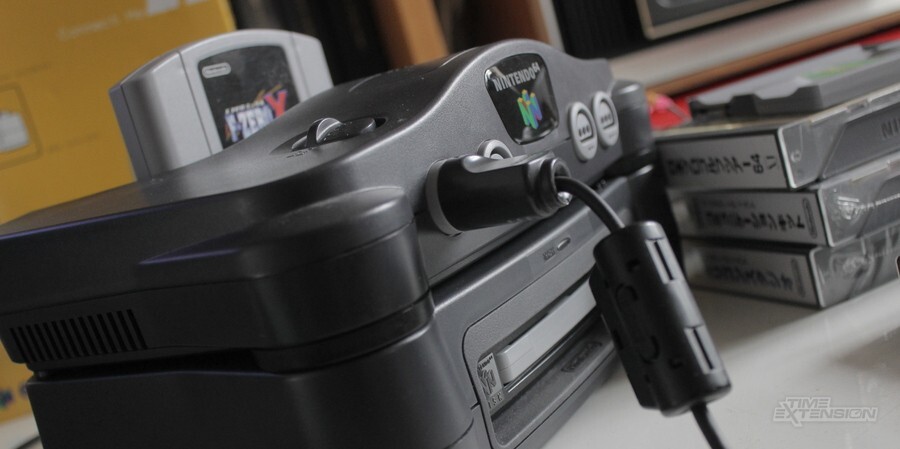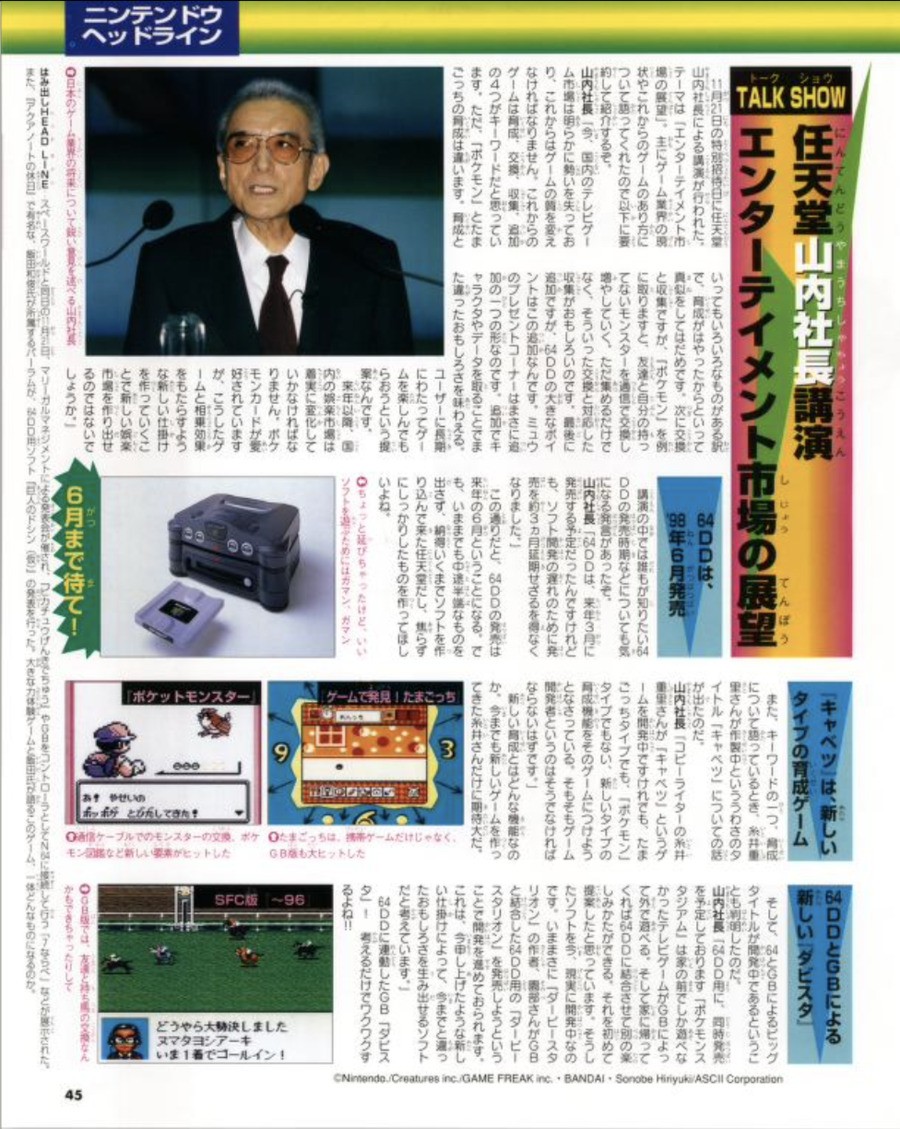
Last year, while working on a feature about the Making of Mario Artist: Paint Studio, we contacted the Japanese-to-English translator Liz Bushouse to help translate some materials related to the 64DD — Nintendo's Japan-only peripheral for the N64 that allowed players to use 64MB magnetic disks to open up new possibilities. This included some excerpts from a talk that Hiroshi Yamauchi gave on the first day of Spaceworld on November 21st, 1997 (as published in Famimaga 64 magazine in February 1998).
As so often happens while writing features, we didn't necessarily find a way to incorporate all of this material into the finished piece but felt that we should still probably publish it in some form or another as it would potentially be of interest to readers. So rather than squirrel it away in some forgotten folder somewhere, we've decided to finally publish the excerpts below along with some added context below to set up each of the topics being discussed.
Just before we get started, something worth mentioning is that some of this keynote was already made available in N64 Magazine issue 11 and on IGN. However, the talk lasted an hour and a half in total and from what we can tell, there doesn't seem to be much (if any?) crossover between what was picked to be included in the Famimaga 64 piece and what was also published by the English-speaking press. So, in other words, think of this as an opportunity to read more of Yamauchi's keynote speech in English for the first time.

One of the key focuses of the talk was the Nintendo president's outlook on the future of the entertainment, with Yamauchi predicting that training, trading, collecting, and add-ons would need to be an essential part of Nintendo's business moving forward to combat this problem:
"The domestic video game market is clearly losing steam, so we have to do something about game quality.
"I think the four keywords for games going forward will be 'training', 'trading', 'collecting', and 'add-ons'. When I say 'training', I'm not necessarily talking about the kind of training you can find in Pokémon or Tamagotchi. 'Training' can encompass a wide variety of things, and just because it happens to be a popular game mechanic at the moment doesn't mean that it should be blindly mimicked. For what I mean by 'trading' and 'collecting', using Pokémon as an example, it's connecting with your friends to trade for Pokémon you don't have, filling out your collection. But just collecting alone isn't enough. It's the trading aspect that really makes collecting fun. Finally, 'add-ons' is a major feature of the 64DD. And Mew's present corner is another example of what I mean by 'add-ons'. Getting additional characters and data is another way to have fun. It lets players continue to enjoy games for an extended period of time.
"Starting next year, the entertainment market must evolve. People are in love with Pokémon cards, and I think that kind of synergy between video games and other products is what we need going forward. By creating new forms of interactions like that, we can rebuild the market."
Elsewhere in the talk, Yamauchi gave an update on the N64DD release window, which had been pushed back from February 1998 to June of that year. As we now know, though, the N64DD would be delayed a further time, eventually releasing in December 1999:
"We had initially planned to release the 64DD in February of next year, but we've had to push that back three months because of delays in software development."
Many of you reading will be aware of the cancelled version of Mother 3 for the N64, but Shigesato Itoi was also working on another project for Nintendo around this time that never saw the light of day. Nicknamed Cabbage, this was to be a pet breeding/raising game that used the 64DD's clock and would have let players download data from the 64DD to use alongside the Nintendo Game Boy. Sadly, no images of the game have ever surfaced, but it's believed to have later inspired the development of titles like Animal Crossing and Nintendogs.
In a December 1997 interview with 64Dream, Itoi joked while speaking to Shigeru Miyamoto "We’re flying this game under the radar of the Nintendo president. That’s what’s fun about it", but in the 1997 keynote speech, Yamauchi references the project calling it "unlike either Tamagotchi or Pokémon", seemingly highlighting its originality.
"Copywriter Shigesato Itoi is currently developing a new type of training game that's unlike either Tamagotchi or Pokémon. And that's exactly what a game developer should aim for."
The last excerpt covers a scrapped idea for the cancelled 64DD version of Pokémon Stadium, which would have seen the game take greater advantage of its Game Boy compatibility. Yamauchi remarks that a new Derby Stallion 64DD game was in development that would eventually realize this idea, but the 64DD version of Derby Stallion was also similarly scaled back in favour of a regular Nintendo 64 release that launched in 2001:
"The initial proposal for Pokémon Stadium, which is planned for simultaneous release on the 64DD, was to transform a home console only game into a portable game with the Gameboy, so that you can play it anywhere you want. And then once you return home, you can connect it to the 64DD for another form of fun. And in fact, that kind of software is currently in development. Sonobe, the creator of the Derby Stallion series, is currently working to release a Derby Stallion game with Gameboy and 64DD connectivity. I think this is a great example of software that creates new contrivances for new forms of fun, like I previously called for."
If you'd like us to share more resources like this, let us know!
